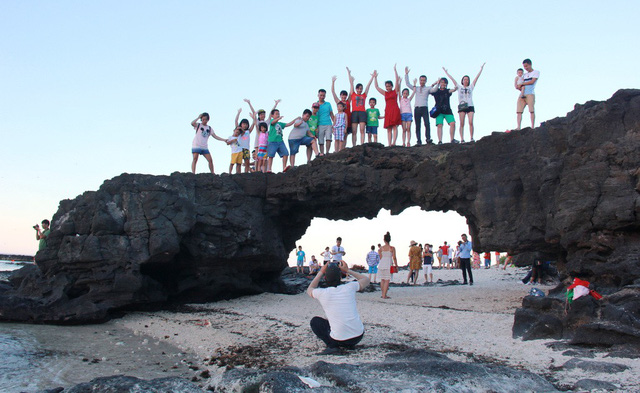Backlash over plan to build resort inside marine reserve in central Vietnam
‘What’s the point of conservation without development?’

Tourists take photos at
an attraction on Ly Son Island that is covered in volcanic deposits. Photo:
Tuoi Tre
The
administration of
The surveys
are to be carried out by Vietnam Infrastructure Investment & Development
Joint Stock Company (VIID) on Quang Ngai’s Ly Son Island to complete dossiers
for the company’s proposal to invest into a local resort project.
The planned
resort would encompass an area of around 70 hectares within the Ly Son Marine
Reserve and the Binh Chau Global Geopark, the latter of which is being filed
for recognition by the United Nations Educational, Scientific and Cultural
Organization (UNESCO).
According to
Nguyen Anh Tuan, deputy director of VIID’s Quang Ngai office, 80 percent of
the project would float on the water’s surface, with only one block of villas
built on land next to an existing residential area.
There are
currently two construction options, he said, the first being to build the
floating structures using light-weight composite materials and securing them
in place with anchors.
The second
option is to use concrete columns as a foundation for the floating villas,
each requiring between six and eight such columns buried deep in the ocean
bed.
“In both options,
the main structure floats on the surface, doing no harm to the geological
platform of the area and requiring no land reclamation,” Tuan said.
“I have
nothing to say to those who insist that putting a few concrete columns into
the ocean would threaten conservation efforts. What’s the point of
conservation without development? Should we all just live on rafts like our
ancestors?” he said.
However, not
everyone has bought Tuan’s line of reasoning, with experts weighing in to
criticize the resort project’s threat to protected waters.
According to
Dr. Vu The Long, an expert from the Vietnam Institute of Archeology, a
development of over 70 hectares would pose an environmental risk to a small
island like Ly Son.
Spanning
less than 1,000 hectares off the coast of Quang Ngai, Ly Son is known for
hosting one of the most well-protected natural ecosystems among
The
construction of the resort would be too much of a risk to the underwater
coral reefs and volcanic geological layers, Long explained.
Meanwhile,
Assoc. Prof. Dr. Vu Cao Minh from
“My advice
is to maintain Ly Son until then and refrain from any invasive activity on
the island,” Minh said.
“Tourists
come to Ly Son for its natural heritage, not because there are five-star
amenities on the island or because it is a shopping paradise,” said Dr. Tran
Van Tan, president of the Vietnam Institute of Geosciences and Mineral
Resources.
“What needs
to be done is to conserve the natural environment and ecosystem. That’s what
sustainable development really is,” he stressed.
Tuoi Tre News
|
Thứ Tư, 17 tháng 1, 2018
Đăng ký:
Đăng Nhận xét (Atom)
Không có nhận xét nào:
Đăng nhận xét